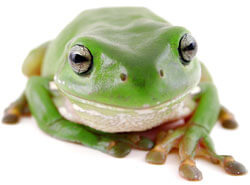Amphibians
Amphibians are not to be forgotten in the amazing groups of animals we see here at BBEVS. We commonly see axolotl and frogs and it is important to remember that every species of amphibian are very different from one another, just as a dog is different to a cat. The requirements needed to keep each species happy and healthy in our homes can vary considerably. Most of the diseases and disorders we see here at BBEVS are a result of these animals missing one or more crucial elements in their environment or diet. The basics of amphibian care include:
 Appropriate tank size for the species and number of amphibians kept
Appropriate tank size for the species and number of amphibians kept- Selecting appropriate species to cohabitate a tank
- Appropriate diet for the species being kept
- Maintenance of appropriate water quality
- Heating or cooling for some species
- UV lighting for some species
Amphibians, like our other exotic species, deal with disease and injury very differently to dogs and cats. Often we don’t notice the subtle signs of early illness and this means that by the time we notice they are unwell, disease can often be advanced.
Please call us on (07) 3217 3533 if you suspect your reptile is unwell and also see below, My Amphibian Is Unwell for further information. At this time we do not make aquarium visits. This page will explain how to transport your amphibian to BBEVS as well as additional requirements for the consultation.
Signs of Illness in Amphibians
- Lethargy
- Change in behaviour
- Change in normal movement
- Change in colour
- Eating less or not at all
- Flashing or rubbing the skin
- Piping or surfacing frequently to gulp air
- Wounds, ulcers
- Lumps and growths
- Discharges
How To Bring Your Amphibian To The Veterinary Clinic
- Please bring a sample of tank water in an old jar or drink bottle. Amphibians must be transported in a separate container
- Bringing other items, such as food, medications and a photo of the tank are also advised
- Using their tank water, place amphibians in plastic containers and ensure there is enough air space in the container or there are adequate ventilation holes. An air stone can help provide oxygen while an axolotl is being transported.
Emergencies
- Please call us on (07) 3217 3533 immediately.
- Please note that we run by appointments. We endeavour to provide all our patients with an appointment time to avoid delays. Emergencies will be triaged by our experienced nursing staff when you arrive.
- See Contact Us for further information on our opening hours and location. Outside of these hours contact the Animal Emergency Centre in (AES) Underwood on (07) 3423 1888.
- Place the animal in a secure travel container (or regular cage if possible) and keep this covered to reduce stress levels in your pet.
